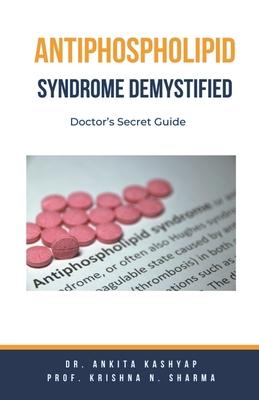Delve into the complexities of Antiphospholipid Syndrome (APS) with "Antiphospholipid Syndrome Demystified: Doctor's Secret Guide." Unraveling the science behind APS, this comprehensive guide provides a step-by-step approach to understanding symptoms, diagnosis, and the psychological impact of APS. Navigating through the patient's journey, the book explores holistic management, encompassing physical activity, stress management, and the vital role of social support. From pregnancy considerations to lifestyle changes, vaccinations, and hormonal factors, readers gain insights into prevention strategies and early detection. The biopsychosocial model takes center stage, addressing biological aspects, psychological factors, and social dynamics in APS care. Personal stories offer a glimpse into living with APS, while practical advice covers coping mechanisms, resilience building, and mental health strategies. From work and relationships to sexual health and travel, this guide empowers readers with tools to navigate daily challenges. With a focus on self-care, nutrition, exercise, and complementary therapies, the book provides a roadmap to enhance the quality of life for those living with APS. Beyond personal well-being, it delves into healthcare systems, advocacy, and community engagement, making it an indispensable resource for patients, caregivers, and healthcare professionals.

Antiphospholipid Syndrome Demystified: Doctor's Secret Guide
Delve into the complexities of Antiphospholipid Syndrome (APS) with "Antiphospholipid Syndrome Demystified: Doctor's Secret Guide." Unraveling the science behind APS, this comprehensive guide provides a step-by-step approach to understanding symptoms, diagnosis, and the psychological impact of APS. Navigating through the patient's journey, the book explores holistic management, encompassing physical activity, stress management, and the vital role of social support. From pregnancy considerations to lifestyle changes, vaccinations, and hormonal factors, readers gain insights into prevention strategies and early detection. The biopsychosocial model takes center stage, addressing biological aspects, psychological factors, and social dynamics in APS care. Personal stories offer a glimpse into living with APS, while practical advice covers coping mechanisms, resilience building, and mental health strategies. From work and relationships to sexual health and travel, this guide empowers readers with tools to navigate daily challenges. With a focus on self-care, nutrition, exercise, and complementary therapies, the book provides a roadmap to enhance the quality of life for those living with APS. Beyond personal well-being, it delves into healthcare systems, advocacy, and community engagement, making it an indispensable resource for patients, caregivers, and healthcare professionals.